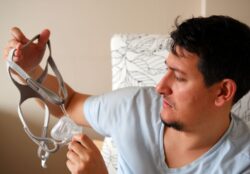CPAP Shortfalls: Signs Your Machine Is Not Working
June 1, 2025
When a patient is diagnosed with obstructive sleep apnea (OSA), most doctors are quick to prescribe a Continuous Positive Airway Pressure (CPAP) machine. Indeed, CPAP therapy is effective for many patients. However, it is not right for everyone! If you believe your machine is not working for you, you could very well be correct. In this blog post, you will learn about signs that you should see a doctor about adjusting your treatment.
You Still Have Sleep Apnea Symptoms
You may expect your sleep quality to improve after starting CPAP therapy, but sometimes, persistent symptoms tell a different story. If you continue to snore, wake up gasping for air, or feel tired throughout the day, these are clear signals that your machine might not be addressing your obstructive sleep apnea effectively.
These signs do not always point to incorrect use; rather, they may indicate that the CPAP settings are not properly adjusted for your needs or that CPAP is not the right solution for your unique anatomy or sleep patterns. It is important to track these ongoing symptoms and share them with your sleep specialist, who can determine whether your current treatment plan requires modification.
Your Machine Makes You Very Uncomfortable
Comfort plays a critical role in the success of CPAP therapy. You may find that the mask is too tight, causes irritation to your face, or leaves marks on your skin. Some people also experience a dry nose, a sore throat, or even develop sinus congestion and nosebleeds. Others find the forced air pressure difficult to tolerate, especially if it feels too strong or inconsistent.
These discomforts can quickly lead to frustration and reluctance to use the device, which ultimately undermines the effectiveness of the therapy. If you struggle to use your CPAP machine nightly due to significant discomfort, it is time to speak with your provider about possible adjustments, mask alternatives, or entirely different treatments.
Your CPAP Is Old or Has Mechanical Issues
Even the most reliable CPAP devices have a limited lifespan. Over time, components may begin to fail, and wear and tear can compromise the machine’s functionality.
If your machine makes unusual noises, does not maintain consistent air pressure, or displays error messages, these may be signs of malfunction. An aging device can also harbor bacteria and allergens, especially if it is difficult to clean or if replacement parts are no longer available.
Using a malfunctioning CPAP machine not only reduces the therapy’s effectiveness but can also expose you to health risks. If your device is more than five years old or shows signs of mechanical trouble, you should consult your equipment provider about servicing, replacing, or upgrading your machine.
You Want to Explore Alternatives
CPAP therapy is effective for many, but it is not the only option for treating sleep apnea. If you cannot tolerate your machine, experience persistent symptoms, or simply wish to find a different solution, discussing alternatives with your healthcare provider is a wise step.
One highly effective alternative is oral appliance therapy. Oral appliances are custom-made devices that fit comfortably in your mouth and gently reposition your lower jaw in order to keep your airway open as you sleep. These appliances are less intrusive than CPAP, easier to use, and do not require electricity or bulky equipment.
You can talk to a qualified sleep apnea dentist to find out if oral appliance therapy might work for you.
Meet the Practice
Drs. Kenneth Mogell and Yitta Garden are the highly skilled sleep dentists at Florida Dental Sleep Disorders. They specialize in providing oral appliance therapy for patients who are fed up with the downsides of CPAP therapy. If you are interested in learning more about this treatment, our team would be happy to speak with you. Contact our Boca Raton office at 561-353-5252.
